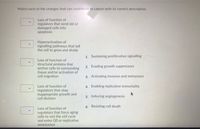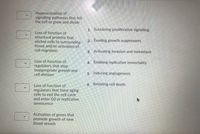
Human Anatomy & Physiology (11th Edition)
11th Edition
ISBN: 9780134580999
Author: Elaine N. Marieb, Katja N. Hoehn
Publisher: PEARSON
expand_more
expand_more
format_list_bulleted
Question

Transcribed Image Text:Match each of the changes that can contribute to cancer with its correct description.
Loss of function of
regulators that send old or
damaged cells into
apoptosis
Hyperactivation of
signalling pathways that tell
the cell to grow and divide
1. Sustaining proliferative signalling
Loss of function of
structural proteins that
anchor cells to surrounding
tissue and/or activation of
cell migration
2. Evading growth suppressors
3. Activating invasion and metastasis
Loss of function of
4. Enabling replicative immortality
regulators that stop
inappropriate growth and
cell division
5. Inducing angiogenesis
6. Resisting cell death
Loss of function of
regulators that force aging
cells to exit the cell cycle
and enter GO or replicative
senescence
00

Transcribed Image Text:Hyperactivation of
signalling pathways that tell
the cell to grow and divide
1. Sustaining proliferative signalling
Loss of function of
structural proteins that
anchor cells to surrounding
tissue and/or activation of
cell migration
2. Evading growth suppressors
3. Activating invasion and metastasis
Loss of function of
4. Enabling replicative immortality
regulators that stop
inappropriate growth and
cell division
5. Inducing angiogenesis
Loss of function of
6. Resisting cell death
regulators that force aging
cells to exit the cell cycle
and enter GO or replicative
senescence
Activation of genes that
promote growth of new
blood vessels
Expert Solution
This question has been solved!
Explore an expertly crafted, step-by-step solution for a thorough understanding of key concepts.
This is a popular solution
Trending nowThis is a popular solution!
Step by stepSolved in 2 steps

Knowledge Booster
Learn more about
Need a deep-dive on the concept behind this application? Look no further. Learn more about this topic, biology and related others by exploring similar questions and additional content below.Similar questions
- The Human papillomavirus (HPV) has been linked to an increased risk of cervical cancer. The HPV E6 and E7 proteins govern the cell via altering cellular proteins. The E6 protein interacts with the tumor suppressor protein p53 and directs its ubiquitin-mediated destruction. Can you elaborate about the P63 gene: its function and if it can be altered/mutated by HPV? If it does, what is the relationship between P53 and P63? Thank you!arrow_forwardChildhood exposure to all of the following risk factors increases susceptibility to cancer except. O a. drugs. b. viruses. O c. ionizing radiation. d. cigarette smoke.arrow_forwardThe best strategy for treating a specific type of human tumor can depend on identifying the type of cell that became cancerous to give rise to the tumor. For some tumors that have colonized a distant location (metastasized), identifying the parental cell type can be difficult. Because the type of IF protein expressed is cell-type-specific, using monoclonal antibodies that react with only one type of IF protein can help in this identification. What IF proteins would you produce monoclonal antibodies against to identify (a) a sarcoma of muscle cell origin, (b) an epithelial cell carcinoma, and (c) an astrocytoma (glial cell tumor)?arrow_forward
- What is inflammation? Describe the main characteristics of inflammation. What characterizes chronic inflammatory disorders? What is the role of NFkB in inflammation and cancer? What are the mechanisms and strategies to inhibit excessive and chronic inflammation? answer should be one page longarrow_forwardWhat would be the effect of a mutation that inactivates the p14ARF tumor suppressor upon p53 functions?arrow_forwardExplain in detail two different genetic mutations that can promote the development of cancer. Include the name (or type) of gene mutated and whether the expression of the gene is upregulated or downregulated. Provide a description of the role the gene plays in regulating the cell cycle and how the cell is affected when the gene no longer produces a functional proteinarrow_forward
- . Describe the general relationship that may exist between mutations and cancerarrow_forwardCancer cells differ from normal cells in several ways. One of the hallmarks of cancer cells is sustained angiogenesis. evasion of apoptosis O all of these are hallmarks of cancer cells. growth signal autonomy. dedifferentiation.arrow_forwardThe majority of metastases are the result of cancer cell invasion through which one of the following (select one)? A. Soft tissues B. Skin C. Blood Vessels D. Lymphatic vessels E. Bonearrow_forward
- Please answer it asaparrow_forwardWhich of the following drugs would directly target the ability of cancer cells to evade cell growth suppressors? (evading the growth suppressor hallmark) Anti-inflammatory drugs VEGF signaling inhibitors Cyclin-dependent kinase inhibitors Telomerase inhibitorsarrow_forwardWhich of the following traits are common to many cancer cells (more than one answer may be correct)A. Uncontrolled growth and divisionB. Chromosomes abnormalitiesC. Absence of a cytoskeletonD. Decreased adhesion to other cellsarrow_forward
arrow_back_ios
SEE MORE QUESTIONS
arrow_forward_ios
Recommended textbooks for you
 Human Anatomy & Physiology (11th Edition)BiologyISBN:9780134580999Author:Elaine N. Marieb, Katja N. HoehnPublisher:PEARSON
Human Anatomy & Physiology (11th Edition)BiologyISBN:9780134580999Author:Elaine N. Marieb, Katja N. HoehnPublisher:PEARSON Biology 2eBiologyISBN:9781947172517Author:Matthew Douglas, Jung Choi, Mary Ann ClarkPublisher:OpenStax
Biology 2eBiologyISBN:9781947172517Author:Matthew Douglas, Jung Choi, Mary Ann ClarkPublisher:OpenStax Anatomy & PhysiologyBiologyISBN:9781259398629Author:McKinley, Michael P., O'loughlin, Valerie Dean, Bidle, Theresa StouterPublisher:Mcgraw Hill Education,
Anatomy & PhysiologyBiologyISBN:9781259398629Author:McKinley, Michael P., O'loughlin, Valerie Dean, Bidle, Theresa StouterPublisher:Mcgraw Hill Education, Molecular Biology of the Cell (Sixth Edition)BiologyISBN:9780815344322Author:Bruce Alberts, Alexander D. Johnson, Julian Lewis, David Morgan, Martin Raff, Keith Roberts, Peter WalterPublisher:W. W. Norton & Company
Molecular Biology of the Cell (Sixth Edition)BiologyISBN:9780815344322Author:Bruce Alberts, Alexander D. Johnson, Julian Lewis, David Morgan, Martin Raff, Keith Roberts, Peter WalterPublisher:W. W. Norton & Company Laboratory Manual For Human Anatomy & PhysiologyBiologyISBN:9781260159363Author:Martin, Terry R., Prentice-craver, CynthiaPublisher:McGraw-Hill Publishing Co.
Laboratory Manual For Human Anatomy & PhysiologyBiologyISBN:9781260159363Author:Martin, Terry R., Prentice-craver, CynthiaPublisher:McGraw-Hill Publishing Co. Inquiry Into Life (16th Edition)BiologyISBN:9781260231700Author:Sylvia S. Mader, Michael WindelspechtPublisher:McGraw Hill Education
Inquiry Into Life (16th Edition)BiologyISBN:9781260231700Author:Sylvia S. Mader, Michael WindelspechtPublisher:McGraw Hill Education

Human Anatomy & Physiology (11th Edition)
Biology
ISBN:9780134580999
Author:Elaine N. Marieb, Katja N. Hoehn
Publisher:PEARSON

Biology 2e
Biology
ISBN:9781947172517
Author:Matthew Douglas, Jung Choi, Mary Ann Clark
Publisher:OpenStax

Anatomy & Physiology
Biology
ISBN:9781259398629
Author:McKinley, Michael P., O'loughlin, Valerie Dean, Bidle, Theresa Stouter
Publisher:Mcgraw Hill Education,

Molecular Biology of the Cell (Sixth Edition)
Biology
ISBN:9780815344322
Author:Bruce Alberts, Alexander D. Johnson, Julian Lewis, David Morgan, Martin Raff, Keith Roberts, Peter Walter
Publisher:W. W. Norton & Company

Laboratory Manual For Human Anatomy & Physiology
Biology
ISBN:9781260159363
Author:Martin, Terry R., Prentice-craver, Cynthia
Publisher:McGraw-Hill Publishing Co.

Inquiry Into Life (16th Edition)
Biology
ISBN:9781260231700
Author:Sylvia S. Mader, Michael Windelspecht
Publisher:McGraw Hill Education